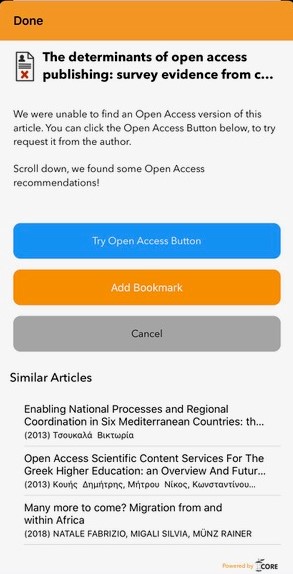The first quarter of 2020 was a highly productive period for CORE in terms of growing and developing our products. Details about these and more news can be found below.
Highlights
CORE is ready to release a premium version of the Repository Dashboard
The CORE team has developed a premium edition of the CORE Repository Dashboard, with a particular focus being on the development of features that support compliance assessment with the REF 2021 Open Access Audit.
The new CORE Repository Dashboard contains a brand new REF compliance and DOI enrichment tabs. This service has been developed to support Higher Educational Institutions (HEIs) with repositories. More specifically, repository managers, research administrators, etc. The interface offers valuable technical information and statistics. Users can benefit from the tool by accessing information that will help them to improve the harvesting of their repository outputs and increase the visibility of their content. The premium edition is currently available to a limited number of users and we plan to expand to all interested institutions in the future. The release of the new version will be announced through a CORE blog-post.

CORE’s products are used by Open Access Helper
 In the beginning of the year CORE was in touch with Claus Wolf, the developer behind Open Access(OA) Helper – an application for iOS mobile devices that helps users get open access articles.
In the beginning of the year CORE was in touch with Claus Wolf, the developer behind Open Access(OA) Helper – an application for iOS mobile devices that helps users get open access articles.
This application enables its users to access research outputs directly on their devices without hitting a paywall. The iOS version of OA Helper makes significant use of the CORE API, by it utilising both the CORE Discovery and CORE Recommender.
Claus Wolf mentions: “The spirit of a common goal enables me to incorporate the key services relating to OA Discovery in a single application. The latest inclusion of CORE Recommender enhancing the user experience further, when no OA copy of the desired document is available (yet).”
To find out more, read the full interview with Claus Wolf about this application in our blog post.
CORE is continuously expanding its ambassadors’ network
One of CORE’s achievements is the further expansion of the Ambassadors network with enthusiastic volunteers. Our goal is to spread CORE’s mission and services to benefit even more researchers and institutions around the world. As of April 2020, we have approximately 40 ambassadors from 20 different countries in the world. With their help we have been able to translate the CORE promotional leaflet into six languages: Russian, Ukrainian, Serbian, Gujarati, Greek and Arabic. Find out more about our ambassadors’ network and how to join it on the CORE’s website.

CORE step by step guides
We are pleased to announce our cooperation with Alex Efimov, Staff Engineer at the Research Office of the Ural Federal University, who created a step by step guide with detailed descriptions and screenshots on how to install the CORE Recommender plug in on DSpace. The post is available in two languages: English, that can be found in our blog, and Russian.

CORE as an enabling infrastructure
 Through its services, CORE delivers a number of key measurable benefits to its stakeholders, such as institutions, repositories, and researchers. However, CORE’s value is not defined by its services only, but also by helping and increasing the content exposure of its content providers with the delivery of specific use cases. Read more about how CORE acts as an enabling infrastructure, that allows for text mining, business intelligence, compliance monitoring and research analytics here.
Through its services, CORE delivers a number of key measurable benefits to its stakeholders, such as institutions, repositories, and researchers. However, CORE’s value is not defined by its services only, but also by helping and increasing the content exposure of its content providers with the delivery of specific use cases. Read more about how CORE acts as an enabling infrastructure, that allows for text mining, business intelligence, compliance monitoring and research analytics here.
CORE Statistics
With regards to the CORE statistics for the period January-March 2020
Content: CORE provides access to 24,936,921 free to read full text research papers with currently hosts 19,511,139 full texts hosted directly at CORE. It also provides 179,463,852 searchable research papers.
Data providers: CORE has added new data providers increasing the content providers to 9,910 in 145 countries.

One thought on “CORE update for January to March 2020”
Comments are closed.